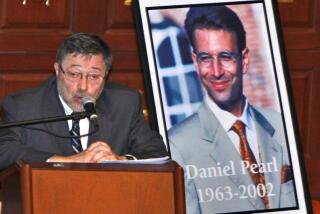Faisal Shahzad gets life term for attempted Times Square bombing
- Share via
Faisal Shahzad, a Pakistani immigrant who admitted he’d hoped to kill as many as 40 people by detonating a car bomb in Times Square in May, was sentenced on Tuesday to life in prison.
U.S. District Judge Miriam Goldman Cedarbaum handed down the mandatory sentence of life in prison without parole.
Shahzad, 31, appeared proud but defiant in court and unapologetic for trying to kill as many Americans as he could. He wore dark blue prison garb with a white knit cap on his head. His hair had grown longer and his beard had grown bushy during his time in jail.
“The sentence does not mean anything to me,” he said, warning that Americans did not understand the plight of his fellow Muslims. “Brace yourself, because the war has just begun.”
Two days after the botched bombing effort on May 1, Shahzad was arrested at JFK International Airport as he attempted to flee the United States for the Middle East. He immediately cooperated with investigators and soon pleaded guilty to 10 counts, including attempted use of a weapon of mass destruction and an attempt to kill or maim.
Shahzad has shown no remorse during court appearances and apparently told investigators he had hoped to pull off a second bombing two weeks after the Times Square attack and as many after that as he could until he was captured or killed. He said he acted alone out of anger about U.S. military action in Muslim countries and mistreatment of Muslims around the world. Yet others allegedly associated with his terrorism efforts also were arrested in the United States and Pakistan as evidence emerged that the Pakistani Taliban was backing Shahzad both with cash and advice.
The son of a retired Pakistani air force marshal, Shahzad grew up mostly in a secular upper-middle-class neighborhood in Karachi, Pakistan’s largest city. He first came to the United States as a teenager in 1998 to study and, over the years, attained some of the trappings of what many in the United States consider a successful life — two university degrees, a wife and two small children, a house in the suburbs, a job as a junior financial analyst, credit cards and an SUV.
Over the years, American military presence in Muslim countries, the plight of Palestinians and perceived insults by Westerners toward Islam apparently began weighing on Shahzad and he was becoming more extreme, according to published reports. In the spring, shortly after becoming a naturalized U.S. citizen, he returned to his native Pakistan, first to spend time with friends and family in Peshawar and later to the volatile Waziristan region, where he spent 40 days training at a terror camp and learning to make bombs. Later, Tehrik-i-Taliban, the umbrella group for the Pakistani Taliban, helped him plot to “injure or kill people,” as he later admitted in a court hearing. He returned to the United States with a wad of cash, about $8,000, half from the Taliban.
In the meantime, his gleaming life in America also was failing. He lost his job, and the house in Shelton, Conn., was in foreclosure; he sent his young family to live in Pakistan with his parents. Living in a rundown neighborhood in Bridgeport, Conn., he began scheming to blow up a car in Times Square. For three months before the attempt, he had monitored through live Internet feeds a crowded corner where he planned to blow up his vehicle.
Shahzad described building three explosives in a rented apartment, loading them in his Nissan Pathfinder and driving an hour into Manhattan on that Saturday night in May. The main component of his weapon was a fertilizer-based bomb held in a gun cabinet in the car trunk. He set the device to blow in five minutes, but when the bomb didn’t work, he walked to Grand Central station and returned by train to Connecticut. He left keys to his Bridgeport apartment dangling from the ignition of that Pathfinder parked at 45th Street and Broadway. The keys and identification number on the SUV helped put investigators on Shahzad’s trail.
More to Read
Sign up for Essential California
The most important California stories and recommendations in your inbox every morning.
You may occasionally receive promotional content from the Los Angeles Times.













